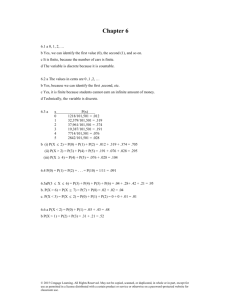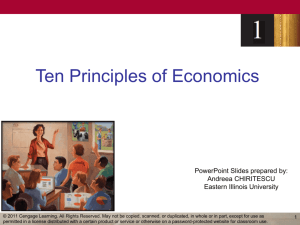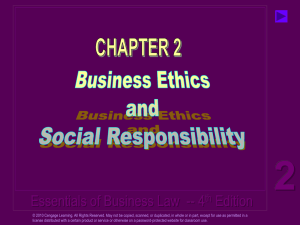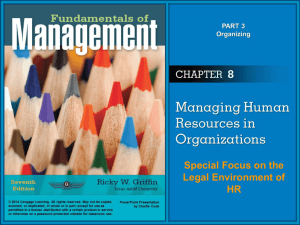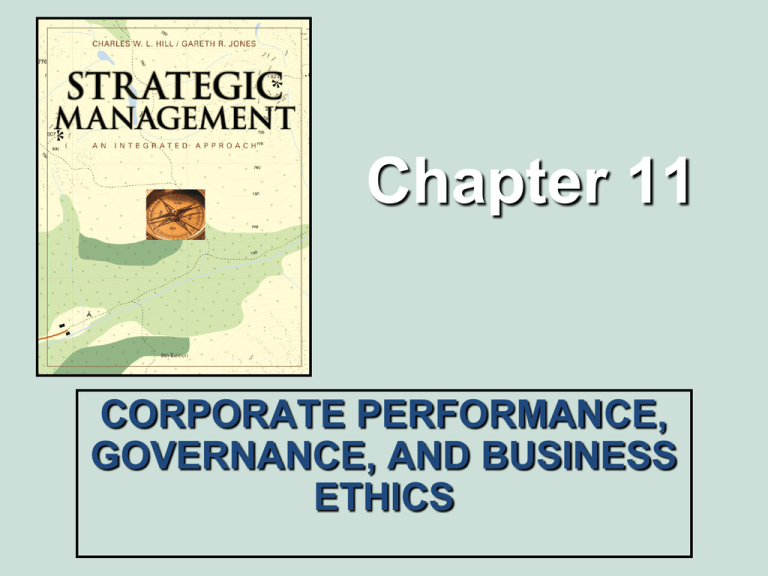
Chapter 11
CORPORATE PERFORMANCE,
GOVERNANCE, AND BUSINESS
ETHICS
Learning Objectives
• Understand relationship between
stakeholder management & corporate
performance
• Explain why maximizing returns to
stockholders often viewed as primary goal
• Describe governance mechanisms to align
interest of stockholders & management
• Explain why governance methods don’t
always work
• Identify ethical issues that arise in business
& causes of unethical behavior
• Identify what managers do to improve the
ethical climate and ensure decisions don’t
violate ethical principles
2010 Cengage Learning. All Rights Reserved. May not be copied, scanned, or duplicated, in whole or in part, except for use as
permitted in a license distributed with a certain product or service or otherwise on a password-protected website for classroom use.
11-2
“There are worse things than
war; and all of them come
with defeat.” -Ernest Hemingway
2010 Cengage Learning. All Rights Reserved. May not be copied, scanned, or duplicated, in whole or in part, except
11 for
-3use as
permitted in a license distributed with a certain product or service or otherwise on a password-protected website for classroom use.
Stakeholders and
Corporate Performance
o Stakeholders: Individuals/groups with
an interest/claim/or stake in company
• Internal (e.g., employees, stockholders)
• External (e.g., customers, creditors,
governments)
o Company must consider stakeholder
claims in developing & implementing
strategy
2010 Cengage Learning. All Rights Reserved. May not be copied, scanned, or duplicated, in whole or in part, except for use as
permitted in a license distributed with a certain product or service or otherwise on a password-protected website for classroom use.
11 -4
Stakeholders and the Enterprise
Figure 11.1
2010 Cengage Learning. All Rights Reserved. May not be copied, scanned, or duplicated, in whole or in part, except for use as
permitted in a license distributed with a certain product or service or otherwise on a password-protected website for classroom use.
11 -5
Stakeholder Impact Analysis
Identify:
o Stakeholders
o Stakeholders’ interests/concerns
o Claims stakeholders likely to make
o Stakeholders most important from
organization’s perspective
o Resulting strategic challenges
2010 Cengage Learning. All Rights Reserved. May not be copied, scanned, or duplicated, in whole or in part, except for use as
permitted in a license distributed with a certain product or service or otherwise on a password-protected website for classroom use.
11 -6
Unique Role of Stockholders
Company’s legal owners and providers of risk
capital, a major source of capital to operate a
business.
Maximizing long-run
profitability & profit
growth is route to
maximizing returns to
shareholders, as well as
satisfying claims of most
other stakeholder groups.
2010 Cengage Learning. All Rights Reserved. May not be copied, scanned, or duplicated, in whole or in part, except for use as
permitted in a license distributed with a certain product or service or otherwise on a password-protected website for classroom use.
11 -7
Profitability, Profit Growth,
and Stakeholder Claims
To grow profits, companies must be doing one
or more of the following:
1)
2)
3)
4)
Participating in growing market
Taking market share away from competitors
Consolidating industry via horizontal integration
Developing new markets
Stockholders receive their returns as:
Dividend payments
Capital appreciation in market value of
shares
2010 Cengage Learning. All Rights Reserved. May not be copied, scanned, or duplicated, in whole or in part, except for use as
permitted in a license distributed with a certain product or service or otherwise on a password-protected website for classroom use.
11 -8
Agency Theory
Agency relationship - whenever one party
delegates decision-making authority or control
over resources to another.
Principal-Agent Relationships
Principal
Authority
Agent
Agency Problem:
• Agents & principals may have different goals
• Agents goals not in best interests of principals
• Agents may take advantage of information
asymmetries to maximize interests at expense of
principals
• Difficult for principals to measure performance
2010 Cengage Learning. All Rights Reserved. May not be copied, scanned, or duplicated, in whole or in part, except for use as
permitted in a license distributed with a certain product or service or otherwise on a password-protected website for classroom use.
11 -9
Tradeoff Between Profitability &
Revenue Growth Rates
Maximize long-run shareholder returns by seeking right balance
between company growth . . . profitability and profit growth.
Figure 11.2
2010 Cengage Learning. All Rights Reserved. May not be copied, scanned, or duplicated, in whole or in part, except for use as
permitted in a license distributed with a certain product or service or otherwise on a password-protected website for classroom use.
11 -10
Challenge for Principals
Confronted with agency problems:
1. Shape behavior of agents to act in
accordance with goals set by principals
2. Reduce information asymmetry between
agents & principals
3. Develop mechanisms for
removing agents not acting in accordance
with goals of principals
Principals try to deal with these challenges
through a series of governance mechanisms.
2010 Cengage Learning. All Rights Reserved. May not be copied, scanned, or duplicated, in whole or in part, except for use as
permitted in a license distributed with a certain product or service or otherwise on a password-protected website for classroom use.
11 -11
Governance Mechanisms
Governance mechanisms limit agency
problem by aligning incentives between
agents & principals - monitor/control.
Mechanisms include:
• Board of Directors
• Stock-Based Compensation
• Financial Statements &
Auditors
• Takeover Constraint
2010 Cengage Learning. All Rights Reserved. May not be copied, scanned, or duplicated, in whole or in part, except for use as
permitted in a license distributed with a certain product or service or otherwise on a password-protected website for classroom use.
11 -12
Governance Mechanisms
Inside Company
Internal agency problems can be reduced by:
o Strategic Control Systems
• Establish standards for performance
• Create systems- measure & monitor
performance
• Compare actual against targets
• Evaluate results- take corrective actions
o Employee Incentives
• Stock options and ownership plans
• Compensation tied to attainment of
superior efficiency, quality, innovation, and
responsiveness to customers
2010 Cengage Learning. All Rights Reserved. May not be copied, scanned, or duplicated, in whole or in part, except for use as
permitted in a license distributed with a certain product or service or otherwise on a password-protected website for classroom use.
11 -13
Balanced Scorecard Approach
Figure 11.3
2010 Cengage Learning. All Rights Reserved. May not be copied, scanned, or duplicated, in whole or in part, except for use as
permitted in a license distributed with a certain product or service or otherwise on a password-protected website for classroom use.
11 -14
Ethics and Strategy
Ethics- accepted principles of right/wrong
governing conduct ...
o Ethical dilemmas:
• No agreement over accepted principles
• None of available alternatives seem acceptable
o Many accepted principles codified in laws:
•
•
•
•
•
Tort – product liability
Contract– contracts/breaches of contracts
Intellectual property– protection of intellectual property
Antitrust law – competitive behavior
Securities law – issuing/selling securities
o Behaving ethically=beyond staying within law
2010 Cengage Learning. All Rights Reserved. May not be copied, scanned, or duplicated, in whole or in part, except for use as
permitted in a license distributed with a certain product or service or otherwise on a password-protected website for classroom use.
11 -15
An ethical strategy is
one that does not
violate the accepted
principles.
11 -16
Ethical Issues in Strategy
Self-dealing
Information manipulation
Anticompetitive behavior
Opportunistic exploitation
Substandard working
conditions
Environmental degradation
Corruption
2010 Cengage Learning. All Rights Reserved. May not be copied, scanned, or duplicated, in whole or in part, except for use as
permitted in a license distributed with a certain product or service or otherwise on a password-protected website for classroom use.
11 -17
Roots of Unethical Behavior
Why do some managers behave unethically?
1.
2.
3.
4.
5.
Personal ethics code- profound influence on
behavior
Don’t realize behaving unethically- failing to ask right
questions
Organization culture- doesn’t emphasize ethics; only
considers economic consequences
Unrealistic goals- encourage/legitimize unethical
behavior
Unethical leadership- encourages/tolerates behavior
that is ethically suspect
2010 Cengage Learning. All Rights Reserved. May not be copied, scanned, or duplicated, in whole or in part, except for use as
permitted in a license distributed with a certain product or service or otherwise on a password-protected website for classroom use.
11 -18
Behaving Ethically
To make sure ethical issues are considered in business
decisions, managers should:
1. Hire/promote people with sense of personal ethics.
2.
Place high value on ethical behavior and ingrain in
the organizational culture.
3.
Ensure leaders articulate and act in ethical manner.
4.
Require that ethics be part of decision-making
process.
5.
Use ethics officers.
6.
Enforce strong corporate governance processes.
7.
Act with moral courage- encourage others to do so.
2010 Cengage Learning. All Rights Reserved. May not be copied, scanned, or duplicated, in whole or in part, except for use as
permitted in a license distributed with a certain product or service or otherwise on a password-protected website for classroom use.
11 -19
“Conscience is the inner voice
that warns us somebody may
be looking.” - H. L. Mencken
“A company’s ethical conduct is
something like a big flywheel. It might
have a lot of momentum, but it will
eventually slow down and stop unless
you add energy.”
- William Adams
2010 Cengage Learning. All Rights Reserved. May not be copied, scanned, or duplicated, in whole or in part, except for use as
permitted in a license distributed with a certain product or service or otherwise on a password-protected website for classroom use.
11 -20


